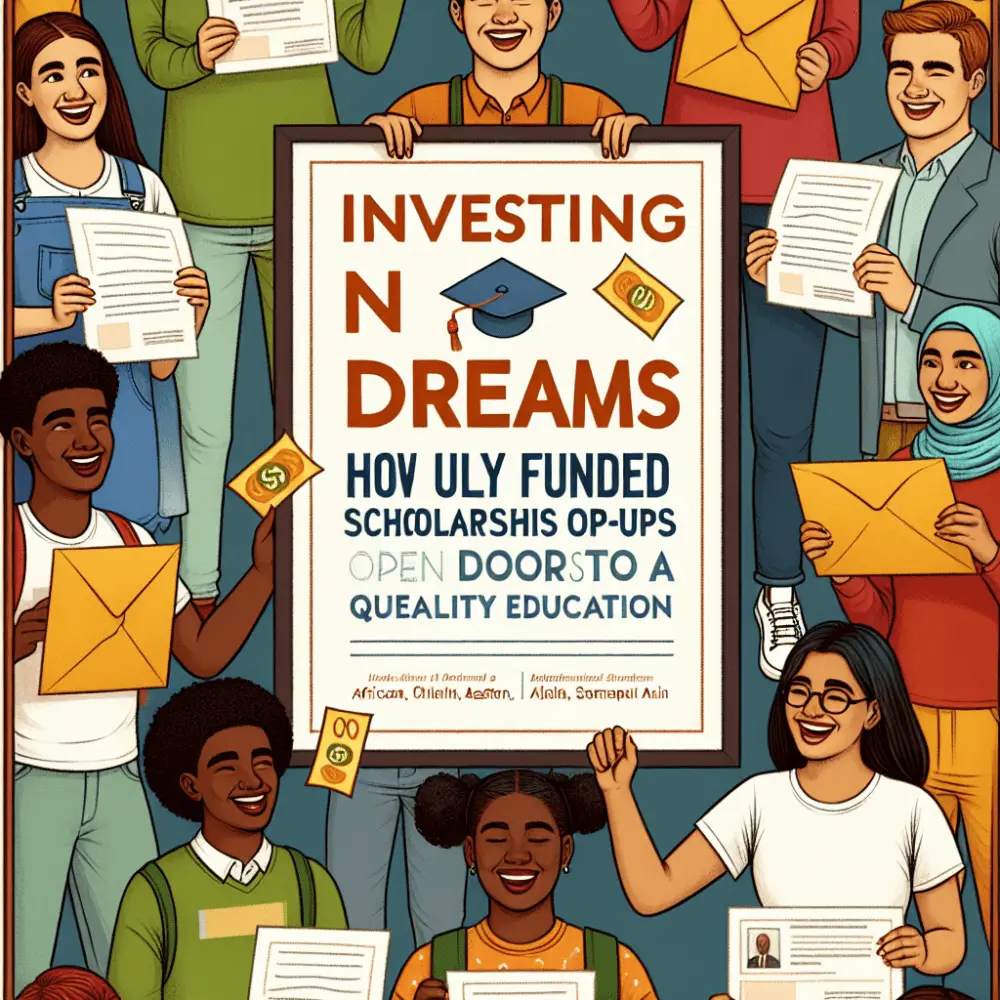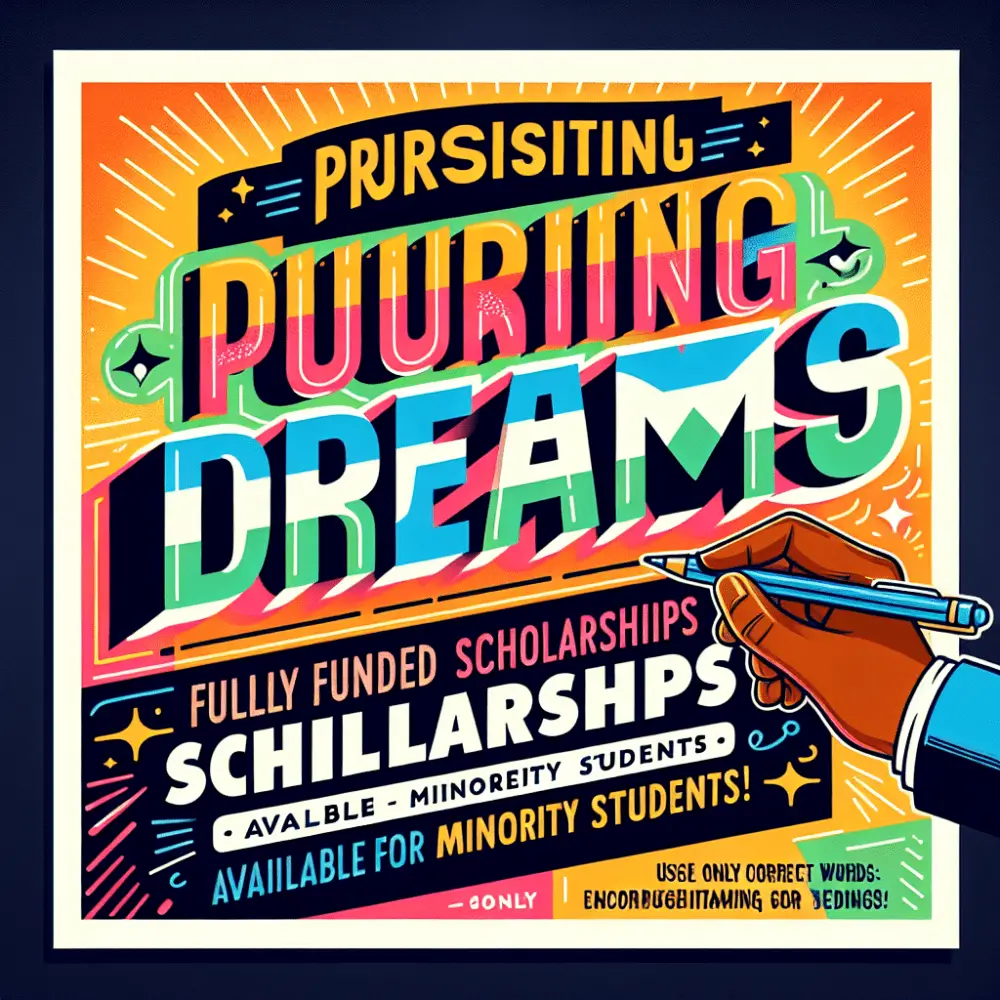
Unlocking Boundless Opportunities: Exploring Fully Funded Scholarships
Education is a powerful tool that has the ability to transform lives and open up doors to boundless opportunities. However, for many individuals, the pursuit of higher education can be hindered by financial constraints. The cost of tuition, accommodation, and living expenses can often seem insurmountable. This is where fully funded scholarships become a game-changer. These scholarships provide a lifeline for talented individuals who are unable to finance their education themselves, offering them the chance to chase their dreams without the burden of financial worry.
In this article, we will delve into the world of fully funded scholarships and explore the various avenues through which students can secure these invaluable opportunities. From government-sponsored programs to prestigious private institutions, we will uncover the secrets to accessing fully funded scholarships and provide guidance on how to make your scholarship application stand out from the competition.
Understanding Fully Funded Scholarships
Fully funded scholarships are grants or financial aid packages that cover not only tuition fees but also a range of other expenses related to education. These expenses may include accommodation, travel costs, textbooks, health insurance, and even a stipend for living expenses. Unlike loans or partial scholarships that require repayment or further financial commitments in the future, fully funded scholarships provide support without any burdensome obligations.
Fully funded scholarships are available at various academic levels, including undergraduate (bachelor’s), postgraduate (master’s), Ph.D., and postdoctoral programs. They are offered by different institutions such as governments, universities, international organizations, foundations, and corporations. While some fully funded scholarships target specific fields of study such as STEM (Science, Technology, Engineering, and Mathematics) or arts-related disciplines; others are open to all fields of study.
The Benefits of Fully Funded Scholarships
The advantages of fully funded scholarships extend far beyond the financial realm. Here are some key benefits to consider:
- Access to World-Class Education: Fully funded scholarships provide students with the opportunity to study at prestigious institutions around the world. This exposure to high-quality education promotes intellectual growth, expands horizons, and enhances career prospects.
- Financial Freedom: By eliminating the burden of tuition fees and other expenses, fully funded scholarships offer students the freedom to focus on their studies without worrying about financial constraints. This allows them to fully immerse themselves in their academic pursuits and make the most of their educational experience.
- Networking Opportunities: Many fully funded scholarship programs provide access to a vast network of professionals, academics, and fellow scholars. This network can be invaluable in terms of mentorship, collaboration, and future employment opportunities.
- Cultural Exchange: Fully funded scholarships often involve studying in a different country or region. This exposure to new cultures, languages, and ways of thinking fosters cross-cultural understanding and tolerance.
- Elevated Career Prospects: Employers highly value candidates who have received fully funded scholarships due to the rigorous selection process and demonstrated commitment to academic excellence. These scholarships can serve as a strong endorsement on a resume/CV.
Finding Fully Funded Scholarships: A Step-by-Step Guide
The journey towards securing a fully funded scholarship may seem daunting at first but with proper research and preparation, it can become an achievable goal. Here are some steps you can follow:
- Identify Scholarship Programs: Begin by researching scholarship opportunities that match your field of study, academic level, and desired geographical location. This can be done through online search engines, scholarship databases, and university websites. Pay attention to application deadlines and eligibility criteria.
- Understand the Selection Criteria: Each scholarship program has its own set of criteria for selection. Familiarize yourself with these criteria to determine if you meet the requirements. Common selection criteria include academic merit, extracurricular activities, leadership potential, research experience, and proficiency in the language of instruction.
- Prepare Required Documents: Most scholarship applications require a comprehensive set of documents such as transcripts, letters of recommendation, statement of purpose/personal statement, research proposal (for research-based programs), language proficiency test scores (e.g., TOEFL or IELTS), and a resume/CV. Gather all the necessary documents and ensure they are tailored to highlight your strengths and achievements.
- Craft an Impressive Personal Statement: The personal statement is a crucial component of any scholarship application. Use this opportunity to showcase your passion for your field of study, outline your career goals, and explain why you deserve the scholarship. Be genuine and persuasive in communicating your story.
- Apply Early: Fully funded scholarships often receive a large number of applications. To increase your chances of success, submit your application well before the deadline to avoid any last-minute complications.
- Seek Guidance: Reach out to professors, advisors, or mentors who can provide valuable insights and guidance throughout the application process. They can offer feedback on your personal statement, help you refine your resume/CV, and potentially connect you with current or former scholarship recipients for advice.
Frequently Asked Questions
1. Are fully funded scholarships available for undergraduate students?
Absolutely! Many fully funded scholarships cater to undergraduate students across various fields of study. Research scholarship opportunities specific to your area of interest and country of choice.
2. What is the average duration of a fully funded scholarship?
The duration of fully funded scholarships varies depending on the academic level and program. Undergraduate scholarships typically cover the entire duration of the degree (e.g., four years), while postgraduate scholarships may range from one to three years. Ph.D. scholarships can last anywhere from three to five years, depending on the research project.
3. Can international students apply for fully funded scholarships?
Absolutely! Many scholarship programs specifically target international students in order to promote diversity and cross-cultural exchange in academic institutions.
4. Do I need to have a high GPA to be eligible for fully funded scholarships?
While a high GPA is beneficial, it is not the sole determining factor for eligibility. Many scholarship programs consider a combination of academic merit, leadership potential, extracurricular activities, research experience, and language proficiency.
5. How competitive are fully funded scholarships?
Fully funded scholarships are highly competitive due to the significant benefits they offer. However, with thorough preparation, a compelling application, and dedication, securing a fully funded scholarship is indeed possible.
In Conclusion
Fully funded scholarships are gateways to educational opportunities that would otherwise be unattainable for many individuals due to financial constraints. These valuable grants not only alleviate financial burdens but also open doors to world-class education, networking opportunities, cultural exchange, and enhanced career prospects. By understanding the steps involved in securing fully funded scholarships and carefully preparing your application, you can unlock boundless opportunities and embark on an enriching educational journey that will shape your future.
















